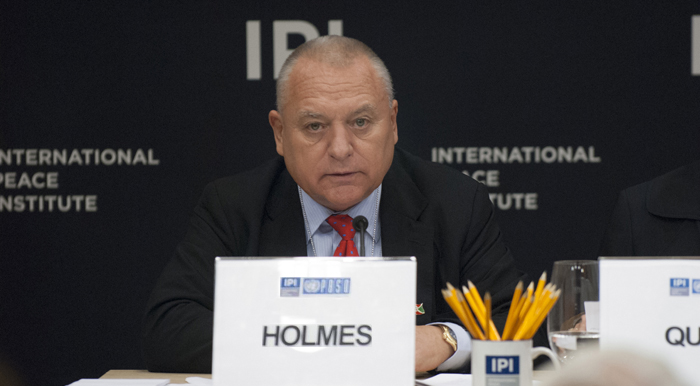
“Countries have more to gain from growing their tax bases than they do from relying on international development assistance,” said Kieran Holmes, General Commissioner of the Burundi Revenue Authority, at an IPI policy forum held on July 10th.
“I believe no country is too small nor too poor to expand its tax base, and even countries devastated by conflict can use domestic revenue collection to stimulate economic recovery,” he said.
Mr. Holmes, who has worked in supporting countries in the Pacific, Africa, and the Middle East to build their revenue administrations, presented lessons and recommendations on domestic revenue mobilization in peacebuilding and statebuilding, and shared ways the international community can support the development of domestic revenue generation and revenue authority systems.
Investors and the business community appreciate a transparent and modern tax administration, he argued. “Building a tax system in a country implies the stimulation of the overall investment climate in the international sphere as well as in the domestic environment.”
The improved business climate, he said, facilitates investment and business growth, leading to more jobs and a reduction in poverty.
Mr. Holmes went on to share some of his own experiences from his work in Rwanda and Burundi. By the end of the tax reform period in Rwanda, he pointed out that the Rwanda Revenue Authority was collecting over 90% of the government’s recurrent budget requirements, which freed the country substantially from aid dependency and allowed for greater domestic investment.
While working in Burundi, the country’s revenue take doubled from $247 million in 2009 to $434 million in 2012 with the creation of the Burundi Revenue Authority. Mr. Holmes explained that they recruited new staff, reduced tax rates, enacted new laws, modernized the tax administration and engaged with other agencies, which created an improved business climate in Burundi.
“It is worth noting that both Rwanda and Burundi were devastated by civil wars. Both are very small economies and both are highly dependent on external aid,” he said.
Mr. Holmes recommended some key steps that are necessary to create the conditions for domestic revenue mobilization across countries. For him, the most important activity is the creation of a semi-independent revenue authority that is able to hire and fire its own employees. Other steps included: transparent recruitment of personnel; creating new modern tax laws; and having a strong, sustained and effective communication strategy that includes trade facilitation and regional integration.
Listing some of the key determinants to success, Mr. Holmes explained that strong top-level political support, long-term and active involvement across the donor community and transparency in the management of the public finances are all critical factors.
Mr. Holmes argued that the international community must ensure that international development assistance be conditional on a country’s willingness to mobilize its own domestic revenue.
“States must be forcefully made aware that they cannot hope to rely on the support of taxpayers from other countries unless they are actively seeking to create the conditions whereby the taxpayers, especially the elites, of their own countries, contribute their fair share” he said. “By adopting this policy we will advance the social contract and make these states into better places for the growth of democracy and the protection of human rights.”
Presenting as a discussant was John Ohiorhenuan, formerly UNDP’s Chief Economist for Africa.
“Countries have much more to gain from growing their tax bases than from relying on international development assistance,” Mr. Ohiorhenuan said. “Building the tax system in a country implies the stimulation of the overall investment climate and I might add, the country’s own economic growth prospects.”
“Tax revenue, properly managed, can far exceed the sum of international assistance and remittances,” he contended, noting that there’s plenty of scope for domestic resource mobilization that can make international development assistance unnecessary within a generation.
During his trip to Rwanda last year, Mr. Ohiorheuan said he saw the lessons in practice with the rise of tax systems, new laws, and tax procedures. He noted that Rwanda is already the most talked about African country in terms of its economy, a lot of it due to its tax administration.
He argued that the exceptional conditions of countries in post-conflict or fragile situations gives the international community leverage but this could be a double-edge sword, underscoring the need to ensure national ownership.
The event was moderated by Maureen Quinn, IPI Director of Programs.
Read the Global Observatory Interview with Kieran Holmes>>
Watch event:







